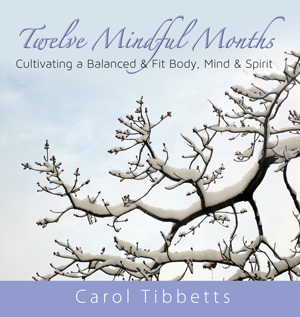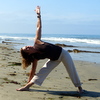Carol Tibbett’s beautiful book, Twelve Mindful Months: Cultivating a Balanced & Fit Body, Mind & Spirit recently received honorable mention for best spiritual book in the Eric Hoffer Awards. The award was established at the start of the 21st Century in memory of the great American philosopher to honor free-thinking writers and independent, academic, and small press books of significant merit.

Though Carol’s book begins in January, I thought as we arrive at mid-summer, now would be a good time to be reminded of the importance of mindfulness in our lives.
JR: Your book is about cultivating a balanced and fit body, mind and spirit and you say the ingredient that is so often missing in our attempt to find the balance is mindfulness. Tell us, briefly, how you describe mindfulness.
Carol: Mindfulness is intentionally paying attention in a non-judgmental way. It’s the ability to be aware of what’s going on in the world both around you and inside you. It’s not being stuck in the past or worrying about the future, but enjoying the present moment. It’s slowing down. It’s letting go of negativity. It’s cultivating resilience. It’s accepting what you cannot change. It’s appreciating what you have. It’s creating a satisfying work/life balance. It’s experiencing life in a more meaningful, authentic and connected way.
JR: How do you think mindfulness can serve writers?
Carol: One of the benefits of mindfulness is increased focus. While a good writing day can feel like a mindfulness meditation when you are completely absorbed and in the flow, the practice of mindfulness as you go about your life will improve your concentration and help your mind stay open to new ideas. I think if you’re a fiction writer or a poet, you’re always looking for inspiration in the world around you – being aware of scenery, people, all your senses – practicing mindfulness and you don’t even know it. Mindfulness also breeds compassion – something we need to feel ourselves if we are to successfully convey it in our writing through our characters and the human condition. To be good writers we must be non-judgmental observers, reporters, listeners – and that’s mindfulness.
JR: Each of the monthly sections begins and ends with a photograph of nature. These are stunning photographs, by the way. How does photography balance your writing?
Carol: As a nature photographer I am framing a shot, looking for the best angles, observing the light and the sky and the effects of weather, seasons and time of day; it’s a lot like writing, whether it be a setting, a dialogue, or a fresh viewpoint. Photography inspires my writing and writing inspires my photography. When I don’t have time or the inclination to write, photography fulfills that creative need. And when I can’t get out and shoot, writing balances me in a similar way. Whether immersed in writing or photography, both feel spiritual, as I feel connected and whole, fully present and balanced. A group of people may all be taking the same photo but each one will be unique, as we all see things in a different way. Just like writing, we choose what to write about and how. A whole class of writers could be given a writing prompt and it’s interesting to see how many different takes there are. As a writing teacher, Judy, I’m sure you’ve observed that.

JR: In the text for each month, you include fitness tips, healthy eating tips, mindfulness tips and journal ideas. Each of the journal ideas offers a theme. January is Creativity, February is Love, April is Hope and so on. How do you see journal writing as important to a balanced life?
Carol: For me (I’ve been journal writing since I was 16) it’s been a way I can release emotions, learn from the past, understand myself, express gratitude, and be mindful about where I want my life journey to take me. To have a balanced life you need to have a quiet mind. If you’re constantly rehashing the same issues there’s no space for fresh inspiration or peace of mind. And research has shown that rumination is linked to anxiety, eating disorders and substance abuse. When I journal, I let fear or concerns go to the page. Seeing the words in black and white reminds me that I don’t have to rework this issue: whenever those thoughts come back I can say “No – I’ve worked this out on paper, I can go back and read it but I don’t need to think about it anymore.” It stops rumination in its tracks. Rumination is corrosive and distracting. Especially for writers. We need to be present to keep our minds open to new insight.
JR: You’re a writer, a fitness trainer, a photographer, a yoga and journal teacher. How do you fit it all in?
Carol: Good question! Somehow – in the course of a day – I fit most of it in, but time will always be a challenge, as it is for most of us who have to earn a living. I try to write – even if it’s just in my journal – or take just one photo every day to stay connected to that which fulfills me. I’m a big opponent to the “all-or-nothing” idea that many people have trouble letting go of. I couldn’t imagine waiting until I retire to write my book or until I’m less busy. That day may never come. I address it with my clients I train and my yoga students. If you don’t have time for a full workout, do some pushups and core work, go for a short walk. If you miss your yoga class, do some sun salutations, a downward dog, or a forward bend. It’s what I try to live by as well. Being the publisher and the publicist for Twelve Mindful Months has definitely challenged me with more time constraints! Instead of a full yoga practice on my days off I sometimes have to resort to 15 minutes or forgo a hike and walk in the neighborhood instead. One ritual that keeps me going: arising early 4 days a week to write even for 1-2 hours before work. There’s no better way to start the day than with something that fulfills you. Skip the internet and the texts, sip your coffee or tea, and sit with your soul and the fresh canvas of a new day.

JR: What inspired you to write this book?
Carol: I feel that in our fast world of multi-tasking and electronics we are becoming less mindful, more distracted, and less connected with nature and others than ever before. And without mindfulness we cannot feel balanced or stay with our healthy eating and exercise intentions. Throughout my 30+ years as a fitness trainer I have heard many people say they can’t begin to remember all that they learn or figure out how to incorporate all the healthy eating, exercise or mindfulness tips into their lives. I was inspired by your book, Judy. Like reading books on exercise or diet or meditation, I didn’t have the time to read books on writing, and when I did it was hard to retain or apply all I’d learned. The format of your book A Writer’s Book of Days was doable and appealed to me. I looked forward to reading each month’s tips and then doing the writing exercise by using your prompts. So I created my book the same way – a perpetual calendar also like your new book, The Lively Muse’s Daily Appointment Calendar as well. Thank you for your inspiration Judy!
JR: And thank you for the shout-out for my books, Carol. Congratulations on your beautiful book, and on it being honored in the annual Eric Hoffer Award and thanks for your thoughtful comments and inspiration.
 Carol Tibbetts has been a fitness instructor for over thirty years; and since 1998, has saved as a fitness trainer, yoga, and journaling teacher at the world-renowned Gold Door fitness spa. Her life-long passion for nature, writing and photography inspired her book. Find out more at true naturepress.com
Carol Tibbetts has been a fitness instructor for over thirty years; and since 1998, has saved as a fitness trainer, yoga, and journaling teacher at the world-renowned Gold Door fitness spa. Her life-long passion for nature, writing and photography inspired her book. Find out more at true naturepress.com

Thank you ladies, the book sounds wonderful 🙂
xx
Thanks for commenting, Vikki. The book IS wonderful. And rich with inspiring as well as practical ideas. Happy summer. Judy